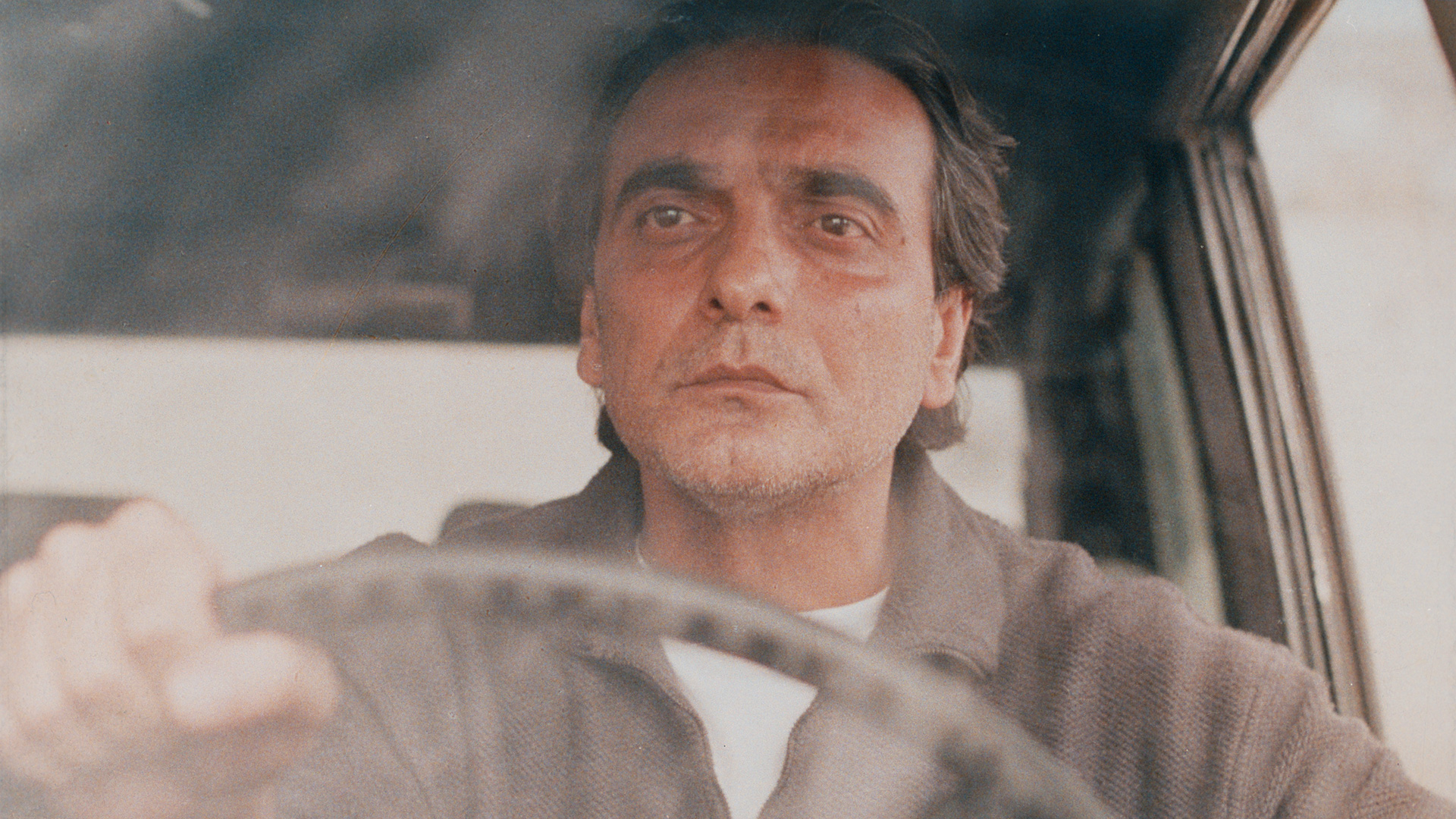Reviews include Superman, Apocalypse in the Tropics, and To a Land Unknown.
In Memoriam: Abbas Kiarostami (1940 – 2016)
July 8, 2016
by Peter Howell
Iranian auteur Abbas Kiarostami, who died July 4 just two weeks past his 76th birthday, was in many respects a stealth filmmaker.
He often filmed without a screenplay, creating metaphor-laden dialogue on the spot for people who frequently were not professional actors. He could take the most unadorned of ideas, something as simple as returning a schoolboy’s lost notebook, and turn it into the transfixing and enchanting humanist cinema that was 1987’s Where Is the Friend’s Home?
So it seems fitting to recall that I discovered Kiarostami almost by accident a decade after that breakthrough film, at the 1997 Cannes Film Festival, the fest’s 50th edition. It was also my first visit.
Kiarostami’s new drama Taste of Cherry was a very late addition to that year’s Palme d’Or competition. It arrived with little advance description, apart from whispers it had barely made it past Iran’s official censors because of its theme of suicide, an act incompatible with Islamic teaching.
Recall that this was long before the Internet became the font of all knowledge and before social media made the Palme hunt seem like a gladiatorial contest. Not beholden to 24/7 deadlines, Cannes journalists back then felt more at liberty to check out interesting films in all the festival’s programs, rather than maintaining a Palme checklist and box score. Back then, too, it was not unusual to have a foreign-language movie screening with French subtitles, not English ones, requiring non-Francophone critics to really work on their semiotics, a skill especially useful for viewers of Kiarostami’s films, especially his more recent Certified Copy and Like Someone In Love.
Thus I wandered into an afternoon screening of Taste of Cherry, in the company of my friend Liam Lacey, then a critic for The Globe and Mail. It was showing in the Grand Théâtre Lumière inside the Palais des Festivals, but the giant auditorium was less than half full, possibly because the beautiful sunny day outside had enticed many festivalgoers to the nearby Riviera beach (Cannes really did used to be a lot more leisurely affair). As we’d feared, there were no English subtitles for the Farsi dialogue. This proved to be no problem, since the story was deceptively simple and could function almost as a silent movie.

It’s about a middle-aged man named Mr. Badii (Homayon Ershadi), who drives a Range Rover around Tehran with a haunted look and a highly unusual request: he seeks a stranger to bury him after he commits suicide. He’s offering scant explanation but lots of money. A soldier turns him down. So does a seminarian. An elderly taxidermist named Mr. Bagheri (Abdolrahman Bagheri) agrees to do the deed, understanding the motivation all too well.
But he questions whether Badii really wants to forego the joys of life, along with whatever pain he thinks suicide will erase.
“You want to give it all up?” he gently asks. “You want to give up the taste of cherries?”
The film made a huge impact on me, turning what seemed going in as a gloomy rejection of life into a magnificent celebration of it. Early in my career as a movie critic, it was an education to me of how much can be said by skilful use of image and inference, without heavy reliance on dialogue and narrative. (When I returned to Toronto, I tracked down and watched his earlier films on VHS tape, the DVD revolution having not yet happened.)
I was delighted when Taste of Cherry won the Palme d’Or a few days later (the prize was shared with Shohei Imamura’s Unagi), smiling when Kiarostami shyly accepted the Palme while wearing his trademark sunglasses (required for light sensitivity, not coolness, although he was very cool).
I was also astonished to read a one-star thumbs down on the film by Roger Ebert of the Chicago Sun-Times, who derided Taste of Cherry as “excruciatingly boring.” Jonathan Rosenbaum, then of the Chicago Reader, rose to Kiarostami’s defense, proclaiming the film a masterpiece and suggesting that Ebert had viewed it through the limited prism of western commercial cinema.
Most critics now would agree with Rosenbaum, I think. But in fairness to the late Ebert, the Hollywood convention of rating narrative over form enjoyed more critical favour 20 years ago than it does now. He wasn’t the only critic to pan Taste of Cherry.
And in credit to Rosenbaum, a real gentleman, his serious disagreement with Ebert didn’t descend into the schoolboy taunting that characterizes too much of today’s social discourse.
Years later, I talked to Kiarostami about Taste of Cherry and the critical reaction to it. The interview coincidentally happened the day after Ebert’s funeral in April 2013.

“I never met (Ebert), actually, and I don’t know if he regretted what he thought about the film at the time,” Kiarostami said.
“But what was interesting for me at the time was, at the very moment when he said this film was rubbish, I remember that another very acknowledged American critic (Rosenbaum) said that it was a masterpiece.
“That’s what I really liked and what I found quite interesting. That really put me in a position that I kept after for years, which is my relationship to critics. They shouldn’t be taken too seriously. There is no scientific basis for judgment about film, so we shouldn’t pay too much credit to them, no matter if they like your film or if they hate it.”
Such considered wisdom was typical of Kiarostami, who went on to explain that he made his movies open to interpretation and debate because “it’s the way I see life. We are human beings and we are complex beings. We all struggle to find out what we actually do in life and what we understand from each other.
“So it’s not that I try to hide anything or retain anything; it’s just that I feel that the films that show us everything about the characters and give us very clear and straightforward information about the characters are more pornographic than realistic. I want to stay as close as possible to real life . . . and I don’t want others to know everything about my deep being, either.”
Kiarostami wanted us to take a deep breath, to look around and to think about life, up to and including the end of our lives. It was a lesson he first taught me through the marvellous mediation that is Taste of Cherry.



